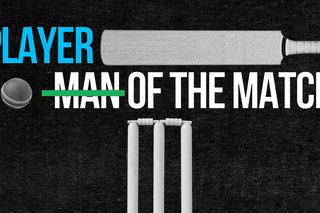
ESPN’s Cricket Site Announces It Will Use Gender‑Neutral Sports Terms
The term ‘batter’ will replace ‘batsmen,’ and the ‘man of the match’ will now be called ‘player of the match.’

In a refreshing turn of events, ESPN’s cricket news website, CricInfo, has said it will replace two words commonly used in cricket coverage with gender-less alternatives, as a concerted step towards adopting a gender-neutral paradigm. The editorial decision is in good company: it joins the league of other international outlets trying to embrace an ungendered terminology. The message is: the language of sports can be more inclusive.
As with all good things, the decision faced scrutiny from a section of enthusiasts who found the change rather unnatural. Some called it a cowardly submission to liberal forces; others claimed it disrespects the ethos of the sport. Many thought the change was a way to allay women’s insecurities about their inclusion in sports, and if women were true fans, they wouldn’t care what word was used; either way, the backlash from followers and digital spectators was sure and swift.
This is what they take issue with: ESPNCricInfo will retire the word ‘batsman’ and the phrase ‘man of the match’ for more inclusive terms: ‘batter’ and ‘player of the match.’ The changes will be implemented on the website as well as any running cricket coverage.
“Words are not just about what they literally mean but about what they imply as well,” ESPNcricinfo’s editor Sambit Pal explained the decision in a blog. “A job title or a role that requires a feminine suffix when performed by women marks an assumption of male primacy.”
The merits of inclusive language in sports are well documented; the vocabulary we use to talk about sports and the people participating in them has cognitive and societal implications. A Cambridge University study analyzed 160 million words from decade-old newspapers, academic papers, and blogs to find that men are three times more likely than women to be mentioned in a sporting context; in contrast to this, women are disproportionately described in relation to their marital status, age, or appearance. “… it does bring to the fore things people maybe aren’t consciously aware of when they’re speaking about different genders in sports,” Cambridge language researcher Sarah Grieves told CNN Sport.
Insistence on a linguistic gender binary leaves women with the shorter end of the stick, as people and media think of them in terms of their personal lives and relationships, as opposed to judging them fairly in professional terms — a privilege that is claimed only by males. Jamaican Olympic champion Shelly-Ann Fraser-Pryce, despite her laurels, is mostly mentioned in relation to her male peer, Usain Bolt. This perpetuates regressive ideas about women’s role in society. Additionally, this binary is only displayed to describe women’s participation in sport, not men’s: a woman cricketer participating in woman’s T20 conceals the bias that sport, by default, is considered to be a men’s arena.
This framing of sport as a natural place for men alienates women. A 2006 paper analyzing language, gender, and sports makes the following conclusion: “Women’s sport is often trivialized and marginalized, and female athletes themselves frequently stereotyped as feminized women rather than competitive athletes.” Arguably, different women may have different responses to being called a batsman: some may be okay with it; others aren’t. But the general principle still perches on reframing our perception of sports as a place where everyone belongs. Experts say this can boost the interest and participation of women in different sports; maybe given enough time it can advance the gender pay gap within the sector, too.
The resistance to the editorial decision is telling; perhaps, the gravest concern enthusiasts have is how it threatens patriarchal insecurity. Thecommon line is that progressive values are tarnishing the sanctity of a sport, and it is best to be blind to gender and sexual identities. Such rhetoric is predictable — as is observed by previous opposition to allowing people to compete under the gender of their choice — but still concerning. Every time a progressive change begins to take shape, minority voices are left to justify the rationality of a decision and end up fielding questions, all of which are shorthand for ‘why must you lay claim to power?’
Maybe a template answer can be this: these changes encourage wider representation and pave the way for equity within the field — and arguably, that is the endgame for any sport. This is why herd mentality can help here: more and more organizations adopting similar changes can help lead by example. Last year, BBC Sports announced something similar, and several English cricket boards are mulling a change as well. If the cricket community and leading organizations embrace this, it can help set a domino effect; sometimes, as the old wisdom goes, you need to fall down to get back up.
Saumya Kalia is an Associate Editor at The Swaddle. Her journalism and writing explore issues of social justice, digital sub-cultures, media ecosystem, literature, and memory as they cut across socio-cultural periods. You can reach her at @Saumya_Kalia.
Related


‘The Simpsons’ Actor Who Voiced Apu Apologizes to Indians for Stereotypical Portrayal
